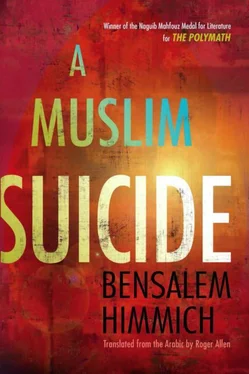
Every time his wonderful words referred to me, he would gesture in my direction and point with both hands. Once he had finished, he sat down again and gave us a superb rendition of some of the short suras from the Qur'an. Whenever he paused, everyone listening would pour compliments on him and offer prayers on his behalf. He then moved on to chant some Qudsi hadith.* The one that I liked best seem to encapsulate the essential core of my own ideas and method (as Al-Shushtari himself realized full well):
I am present in the thought of my servant and I am with him when he mentions My name. If he mentions Me in his own soul, then I remember him in a manner better than them. If he approaches within a single inch of Me, I am but a forearm's length away. If he comes within a forearm's length, then I am but a full arm's length away. If he approaches me at a walk, I come to him apace.
He added to it another Qudsi hadith that has been very influential with those scholars who focus on God's unity. It begins:
The worshipper continues his course toward Me with supererogatory acts until such time as I come to love him.
Our celebration continued to regale and enrich us with pearls and gifts like these until it reached its crowning moment-and both Abu al-Hasan and I participated in it with them all-in a wonderful Sufi dhikr, during which we all looked upward toward the One who was inspiring it and bodies and souls quivered in ecstasy. "Peace it is till the break of dawn." After which the entire group made its way to the Azhar Mosque for the prayer.
How wonderful Sufi ceremonies are! With Abu al-Hasan involved, they turn into a kind of prayer, of wisdom. Wherever he is involved, you can guarantee that they will be at their most elevated and superb. He insists that the ascetics involved should be able to indulge in some creative competition and defensive communication. One day, while I was in Bijaya, he confided certain information to me that shed light on the contents of his poem that begins
Show respect at the gate of the monastery and remove your shoes, Give your greetings to the monks and linger with them a while.
"Saint of God," he told me, "no harm can come from listening to the chants of priests and deacons. However, if we fail to surpass them in stressing the unity of existence and its Creator, then we gain nothing. That requires of us the highest level of attention and exceptional kinds of music." It was absolutely typical of this brilliant man's humility that he added, "On matters of dancing and singing I have an eminent predecessor in Abu Abdallah al-Shawdhi al-Halawi-may God have mercy on him!"
I spent a further ten days in the company of this wonderful companion. During that period we got to hear of the martyrdom of Abu al-Naja on the field of battle at Damietta. We both mourned his loss, and Abu al-Hasan proceeded to tell me about his remarkable deeds. Among the things I learned was that for half the year this ascetic would refrain completely or at least substantially from talking; it had so happened that my arrival had coincided with that particular period. We were also receiving a number of reports concerning the ways in which Al-Qastalani was blackening my name in all kinds of circles and meeting places and trying to turn the sultan's coterie against me. These reports kept arriving in bits and pieces from followers and disciples in whom he had complete trust.
There came the evening when my companion broached the topic in some alarm.
"Dear holy man of God," he told me, "you've extended your stay here in order to take care of me and make sure I survived. Now that I'm feeling much better, I don't want you to get yourself in trouble on my account. The governor's and AlQastalani's spies are following you wherever you go. Last night during our Sufi ritual they infiltrated the group disguised in Sufi garb and followed the necessary rituals. Some of those present who were genuine Sufis wanted to throw them out, but I rejected the idea. I wanted them to see that our only goal was piety and good works. Fairly soon I'm going back to Bijaya where I can continue to train my soul in accordance with God's will and yours too, dear colleague. But you need to continue your journey to Mecca, the mother of all cities, that being your destination. I hope to be able to join you there when circumstances permit-once the current crises are coming to an end and glimmerings of better times are visible."
So it was that at dawn the next morning I got up and prepared my horse and baggage. All the while my companion was weeping and handing me books, folders, and addresses. As we embraced, I whispered in his ear, "You most blessed of sages, your eye always beholds what is right." I now headed for Giza in the company of some students. When we arrived, I bade them farewell, consigning to them the care of their revered shaykh. Near the pyramids I encountered a caravan that was about to leave for the south and came to an agreement with the head camel-driver on terms under which I would accompany them as far as 'Aydab on the west coast of the Red Sea. The deal involved my traveling in their number for part of the time and going ahead to find stopping places for them at other times. I would not be getting off my horse except to rest and sleep, sometimes in a religious hostel, other times in a hotel.
THE JOURNEY STARTED on the road from Minya to Bush Fadlas, where we had to stop for two days in order to buy fine-quality cotton very cheaply. From there we moved on to Minya ibn Khusayn, Manfalut, and Asyut, from where we crossed over to Akhmim Faqus. We used to stop regularly and take a rest, but during the exhausting journey to 'Aydab my horse died of thirst and exhaustion, so I completed the journey on a camel whose owner had died during a sandstorm. It so happened that the caravan was now joined by an official government party protected by armed soldiers, so the two groups joined together. That way the pilgrim group was able to help on matters of pious behavior, tending the sick and burying the dead after prayers had been pronounced over them. In all this I helped as much as I could and discussed with an expert on sea travel the best time to set sail. During this period, I was being called either Abu Hamada al-Ghafiqi from Sabta or simply Ibn Dara.
The party spent the better part of a month sharing the little water we had until it almost ran out and doing our best to cope with the trials and hardships that desert travel involves. By way of diversion they indulged in games of chess and stick-fights (where I had considerable success). Whenever things were especially bad, they confronted the situation by reciting prayers and litanies. Some of them went almost crazy and started cursing the buffeting wind. I told them not to do that, citing the hadith that says, "Do not curse the wind, for it is the spirit of God, bringing mercy and trial. Ask God for its benefits and seek refuge in Him from its evil effects."
Early one morning, the desert wind calmed down and blew softly; the sea calmed down as well. Everyone agreed that now was the time to get on the ferryboat and head for Jedda under God's protection. Thus it was that, after a day and night's voyage, we anchored in a port at evening time. Along with the other pilgrims I stepped off the boat in Jedda. There I spent the second half of the month Dhu al-Qa`da along with a group from both the Maghrib and Egypt. We got to know each other well; most of them were rich merchants who were spending most of their time going about their own business. I only saw them at night when we would all try to get some rest in the light breezes that blew over the roof of the house that we had all rented. For my part, I spent the whole day reading and praying; for the latter activity I always selected smaller mosques where there was less noise, and where the heat and humidity were fairly low.
Читать дальше













